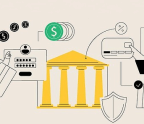CORONAWASHING: HOW CAN FIRMS ESTABLISH MORAL AUTHENTICITY?

The Covid-19 pandemic represents both challenges and opportunities for brand marketing. Spreading rapidly around the globe, the novel coronavirus affected every level of society and nearly every facet of everyday life, imbuing everyday activities with a sense of fear and uncertainty, but also instilling a renewed concern with solidarity and altruistic values. Meanwhile, confinement measures and shifts in consumer behavior forced many businesses into hiatus and vastly limited their ability to reach their target market. Consumers evinced a shift in priorities: for many, the pandemic led to a re-evaluation and a desire to return to fundamental values.

Consumers evinced a shift in priorities: for many, the pandemic led to a re-evaluation and a desire to return to fundamental values.
What this has meant, for organisations, is a knot of marketing challenges. Few have ignored the crisis entirely. Some were reduced to marketing in absentia, reassuring customers of their continued existence. Others struggled to strike the right tone between their typical brand voice and the need to show a concern about the crisis. Many companies chose to show visible support for coronavirus relief efforts, with positive results: companies distributed masks, donated to worthy causes, or switched to manufacturing PPE and other essential supplies. Luxury companies in Europe elicited positive media coverage by providing direct support to health services: in March 2020, when the WHO declared Covid-19 a global pandemic, LVMH announced that it was devoting its perfume production lines to making hand sanitiser for French hospitals; Prada manufactured 80,000 medical overalls and 110,000 masks to distribute to healthcare workers in Italy. Other efforts, however, have been met with public backlash: Adidas and Primark are among the brands that faced a negative response when their contributions to relief efforts were deemed hypocritical. In all cases, ‘marketing as usual’ was not an option.
Crisis marketing represents a clear opportunity for brands to stand out through positive ethical engagement. Companies can deploy social marketing strategies as they integrate “good citizenship” within their corporate governance model (Maignan and Ferrell, 2000); their moral commitments can enhance their perceived value as well as their economic value creation (Pies et al., 2009). Yet crisis marketing also entails risks, as brands may be
You’re reading a preview, subscribe to read more.
Start your free 30 days



